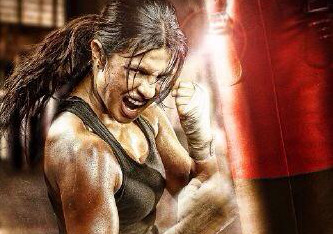
You wouldn’t normally associate beauty queens with boxers and swollen faces. But in the fantastical world of Bollywood, anything is possible. Former Miss World Priyanka Chopra returns to the big screen as Mary Kom, the Indian Olympian and one of the world’s top woman boxers.
The trailer for the film was released on Wednesday, a day earlier than scheduled, following the announcement that the biopic will have its world premiere at the Toronto International Film Festival. Chopra’s casting as a tough-as-nails boxer who rises from extreme poverty in India’s remote Manipur state has already been met with scepticism. With the release of the trailer, critics are likely to be left unconvinced.
For starters, Chopra and her bee-stung lips still look far too glamorous even with blood oozing from her cheeks, or as she fights a man four times her size in an underground boxing ring. Then, there’s that small issue of similarity: Chopra looks nothing like Kom.
Kom, like many people from Manipur, which shares a border with Myanmar, looks South East Asian. Chopra, despite her devotion to the project (bless her), doesn’t. In fact, none of the main characters do, including her coach, her father and even her husband.
And that brings us to our final point: that burning issue of, erm, racism. The people from Manipur, along with other states from India’s north east region, have, for many years, complained of being treated as second-class citizens because of how they look. That producers of Mary Kom couldn’t find actors from the region to play any of the characters, including Kom’s, is not going to go down very well in the boxer’s home state, where Bollywood films are still banned by separatist militants.
The irony of all this is that Kom, the only woman boxer in the world to have won a medal in each one of the six world championships, has wholeheartedly blessed the project and the film.
Whatever it is, here’s hoping director Omung Kumar would have at least crafted a story worthy of Kom’s inspiring rags-to-glory story. And it’s all now on Chopra, who has won critical acclaim for her protrayal of a supermodel (Fashion, 2008) and an autistic (Barfi, 2012), to convince us she can knock this one out.











